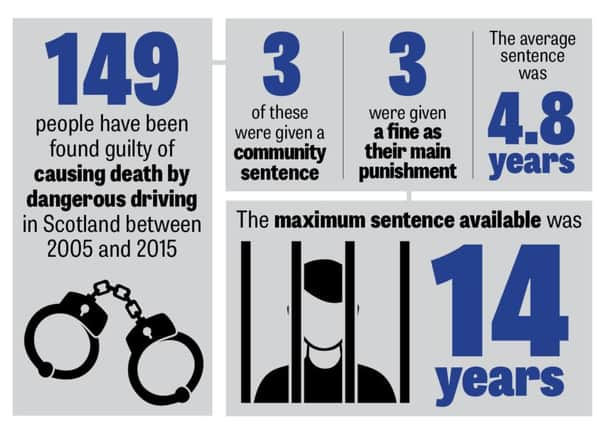Drive for Justice: Our campaign for stiffer sentences for dangerous drivers


And our investigations team can reveal the average sentence for death by dangerous driving is only 4.8 years – when the maximum is, in fact, 14 years.
Grief-stricken families expressing disappointment outside courts following the sentencing of motorists – whose reckless behaviour has claimed almost 300 lives on Scotland’s roads since 2005 – have become an all too familiar sight as lives continue to be lost.
Advertisement
Hide AdAdvertisement
Hide AdBut figures obtained from the Scottish government lay bare the full extent of the disparities in the way the law and the criminal justice system is dealing with drivers, some of them under the influence of drink and drugs, who are responsible for deaths described by the bereaved as “feeling like murder”.


An investigation by The Falkirk Herald, our sister titles and The i details for the first time what campaigners argue is the chronic leniency of the courts in dealing with killer drivers.
It is hoped the findings will increase the pressure on the Government to revise sentencing rules for dangerous driving offences.
Data obtained from the Scottish Government shows:
n In the years since Parliament increased the longest sentence from ten to 14 years in jail, the average sentence for 149 motorists convicted of death by dangerous driving in Scotland has been just 4.8 years.
Advertisement
Hide AdAdvertisement
Hide Ad

n A total of 98 people convicted of death by dangerous or careless driving in Scotland since 2005 have walked free from court. Of that total, 77 received community service. In 21 cases, the offender escaped with only a fine while two were released with ‘admonishments’.
A long-delayed consultation on a review of sentencing in dangerous driving cases has been promised by Westminster ministers to begin by the end of the year.
The Scottish Sentencing Council unveiled a review in October this year.
Critics point out that the Westminster review was first promised in 2014 and a former Cabinet minister has accused current ministers of “foot-dragging” over the issue, saying it was clear that the law and sentencing governing culpable deaths on Britain’s roads was “wholly inadequate”.
Advertisement
Hide AdAdvertisement
Hide AdCampaigners are now demanding a package of measures, including a root and branch review of sentencing guidelines for judges to ensure that tougher sentences are imposed in the most serious cases, as well as the closure of loopholes which mean that it is in the interest of drink drivers involved in a fatal collision to flee the scene.
Brenda Mitchall, a lawyer who specialises in securing compensation for those killed on Scottish roads, said: “There is, in my opinion, a problem with our justice system, both criminal and civil, where we consistently fail to acknowledge the frailty and vulnerability of road users who choose active travel, whether by bicycle or on foot.” The senior partner of Road Traffic Accident Law (Scotland) added: “At present, our criminal justice system does not act as the deterrent it should.
“Careless drivers are occasionally fined for breaking the bones of cyclists and are then left free to carry on driving uninterrupted.”
Every day an average of five people are killed across all UK roads, all too often in sudden and traumatic circumstances which families liken to losing a loved one to violence.
Advertisement
Hide AdAdvertisement
Hide AdIn cases where such deaths arise from an act of criminality, the consequences are all the more devastating.
The i/Johnston Press investigation team has spoken to numerous families who have had to cope with the loss of a loved one to an act of dangerous driving.
The vast majority said that sentencing is often too lenient and they feel let down by failures across the system of sanctions, including a decline in the use and length of driving bans and an apparent willingness of prosecutors to accept a lesser charge of causing death by careless driving.
Audrey Fyfe (75) was riding down an Edinburgh street in 2011 when driver Gary McCourt turned right across her path and knocked her off her bike. She died several days later. McCourt had previously killed on the roads. However, he escaped jail and was given community service and a driving ban.
Advertisement
Hide AdAdvertisement
Hide AdAudrey’s daughter Aileen Brown said: “I just don’t understand – how many people does he have to kill before society or the judiciary see it as appropriate that he should not be driving?
“If someone had a similar offence with firearms they would not be given a firearms licence back.
“Or if they were found guilty of inappropriate behaviour towards children we would not allow them to go back to teaching.
“So why are we allowing someone to go back to driving when the car is like a weapon for them?”
CAMPAIGN
Advertisement
Hide AdAdvertisement
Hide AdThe Drive For Justice campaign – by The I and Johnston Press papers across the country – aims to give families who have lost loved ones to reckless and criminal driving a voice for fairer sentencing.
Around five people are killed on UK roads daily.
Our campaign calls on the Government to:
n Re-work sentencing guidelines and provide specialist training for judges so they can use the full powers that are available to them when deciding sentences;
n Give tougher sentences for the worst offenders;
n Treat all culpable deaths as manslaughter/culpable homicide;
n Have more – and longer – driving bans for those who kill or seriously injure or risk injury and death on our roads;
Advertisement
Hide AdAdvertisement
Hide Adn Examine how people are often prosecuted for the lesser charge of death by ‘careless’ driving rather than by ‘dangerous’ driving. Families often feel the lesser ‘careless’ charge undermines the severity of the offence.
n Close the loopholes that exist as with hit-and-runs; failure to stop carries a maximum of six months jail while drink driving penalties are tougher. So a driver who has been drinking can get a lesser sentence if they flee the scene;
n Have even tougher sentences for those who offend while drink or drug driving, use excessive speed, are disqualified/unlicensed or drive while using their phone.
VOICE
The Scottish Sentencing Council, which was established in October last year and is to review death by dangerous driving, said its primary objective is to promote a better understanding of how sentences are decided.
Advertisement
Hide AdAdvertisement
Hide Ad“One of the first offence specific guidelines we are preparing is on the topic of death by driving,” a spokeswoman said. “The circumstances in these cases are often complicated and this can lead to extremely challenging sentencing decisions.
“The guideline will assist people better to understand the factors taken into account when sentences are decided.
“We will consult widely on all our guidelines before they are approved and implemented.” The Ministry of Justice declined to give a date for the launch of its consultation. A spokesman said: “This government is determined to make sure sentencing fits the crime for those who kill or seriously injure on our roads. “That is why we will launch a consultation on dangerous driving offences and penalties by the end of the year.”
But Gary Rae, campaigns director at road safety charity Brake, said: “If your loved one was shot dead, everyone would say how horrific that was. But people are more accepting and complacent about road deaths. “The law needs to change so sentencing fits the crime.”